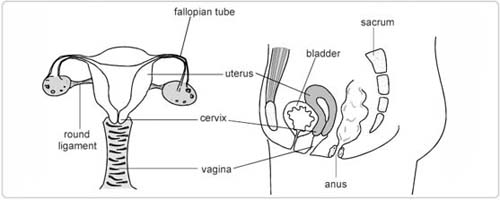What is it?
An earlier examination shows that there are some abnormal cells on the neck of the womb (the cervix) which could become malignant (cancer causing) if left untreated. The surface layer of the cervix is taken away. This is called a biopsy. The biopsy is shaped like a cone, giving the name cone biopsy. The biopsy is examined under the microscope. Often, a cone biopsy is all that is needed. Sometimes, a bigger operation on the womb is needed later. This depends on the microscope examination.

The Operation
You will probably have a general anaesthetic and be completely asleep. The surgeon looks at the cervix through the vagina. With special instruments, he removes a cone of the cervix. You will be in hospital for one to two days.
Any Alternatives
If you leave things as they are, the problem with the cervix is likely to get worse. You may be missing the chance of having early treatment. Scans and X-rays will not get the doctors any further forward. You do not need to have a large operation at this stage.
Before the operation
Stop smoking and get your weight down if you are overweight. (See Healthy Living). If you know that you have problems with your blood pressure, your heart, or your lungs, ask your family doctor to check that these are under control. Check the hospital's advice about taking the Pill or hormone replacement therapy (HRT). Check you have a relative or friend who can come with you to the hospital, take you home, and look after you for the first day or two after the operation. Sort out any tablets, medicines, inhalers that you are using. Keep them in their original boxes and packets. Bring them to hospital with you. On the ward, you may be checked for past illnesses and may have special tests, to prepare you for the operation. Please tell the doctors and nurses of any allergies to tablets, medicines or dressings. You will have the operation explained to you and will be asked to fill in an operation consent form. Many hospitals now run special preadmission clinics, where you visit for an hour or two, a few weeks or so before the operation for these checks.
After - In Hospital
You may have a small/thin plastic tube (a drip) in an arm vein. This gives you essential fluid, for a day or so from a plastic bag on a stand. You will have a sanitary pad in place. You may have some lower abdominal pain or backache. This is usually no worse than a period pain. You may need tablets for the pain. Tell the nurses if you are still in pain. You will be expected to get out of bed soon after the operation. You should be ready to go home either the same day or the day following surgery. There will be slight bleeding like the end of a period. You should wear pads. Do not use tampons for three to four weeks.
A general anaesthetic will make you slow, clumsy and forgetful for about 24 hours. Do not make important decisions during that time. The nurses will help you with everything you need until you can do things for yourself. The discomfort of the operation can make it difficult to pass urine and empty the bladder. It is important that your bladder does not seize up completely. If you cannot get the urine flowing properly after six hours, contact the nurses or your doctor. You will be able to take a bath or shower as often as you want. You will be informed of the results of the biopsy when it is available. The nurses will advise about sick notes, certificates etc.
After - At Home
You may feel very tired for a day or two. You will be back to normal after a few days or so. You can get back to driving after three days. You can start sexual relations, after six weeks. You should be able to return to a light job after about one week.
Possible Complications
As with any operation under general anaesthetic there is a very small risk of complications related to your heart or you lungs. The tests that you will have before the operation will make sure that you can have the operation in the safest possible way and will bring the risk for such complications very close to zero.
Most cone biopsy operations are quite straightforward. Sometimes the cervix bleeds heavily in the 24 hours or so after the operation. The cervix may need to be stitched at a second operation. Contact your doctor or the ward if the bleeding happens when you are at home. Rarely, the opening in the cervix narrows with scarring. This may cause pain with the periods, or difficulty in labour. The doctors can advise you about this. Very rarely, a large biopsy weakens the cervix. This may lead to miscarriage and early labour. There are ways of dealing with this. A cone biopsy does not cut down the chance of pregnancy. Rarely, the doctors are not sure about the biopsy, and will need to take another piece. They will let you know about this in the clinic.
Advanced Reproductive Technology
- In Vitro Fertilisation (IVF)
- Intracytoplasmic Sperm Injection (ICSI)
- Donor egg and embryo programs
- In Vitro Fertilisation (IVF)
- Pre-implantation genetic diagnosis (PGD)
- Surrogacy programs
Dental Videos





